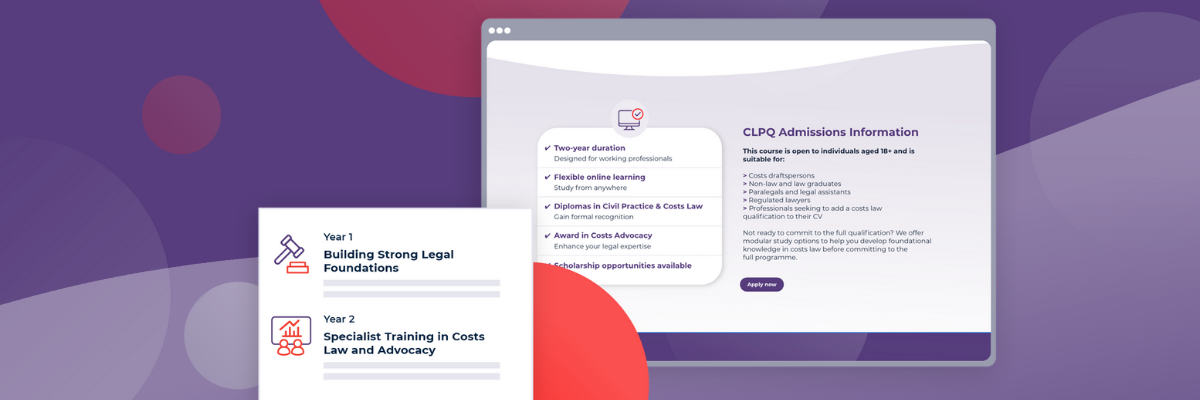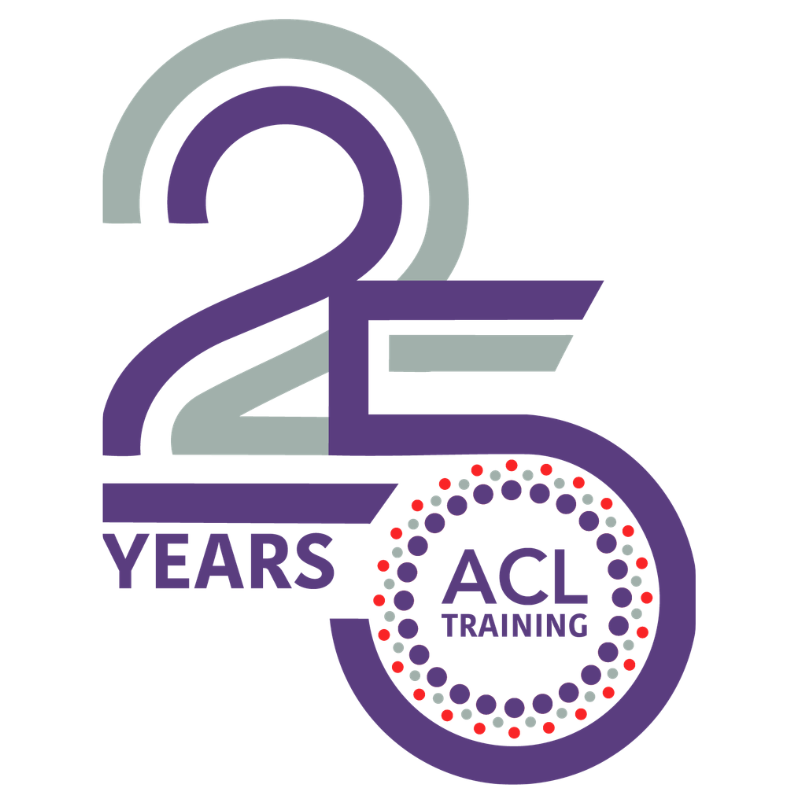Qualifying as a Costs Lawyer: Recognition and Regulation

If you’re considering a career in law and want a role that blends litigation strategy, financial management, and client impact, qualifying as a Costs Lawyer could be the path for you. The Costs Lawyer Professional Qualification (CLPQ) offers a clear route into a regulated profession that plays a vital role in the justice system.
Thinking of qualifying into a regulated legal role? Read this blog to discover what a Costs Lawyer does and why now is the ideal time to get started.
A Regulated Role at the Heart of Litigation
Costs Lawyers hold a unique position within the legal profession. Recognised as one of the eight regulated legal professions under the framework of the Legal Services Act 2007, they are authorised to carry out specific reserved legal activities relating to costs proceedings.
This includes:
- Rights of audience in costs-related hearings
- The right to conduct litigation in relation to costs
- Administering oaths
By gaining these rights, Costs Lawyers are able to work directly with clients, courts, and legal teams, playing an active role in litigation.
What Makes a Costs Lawyer Different?
Costs Lawyers don’t just support litigation, they shape it. Their insights into legal budgeting, costs recovery and funding mechanisms influence how disputes are run, settled, or defended. They work closely with solicitors, barristers and clients to ensure cost strategies are accurate, defensible and aligned with litigation goals. Their role enables effective collaboration and seamless case management.
Unlike unregulated costs professionals, Costs Lawyers are subject to the regulation by the Costs Lawyer Standards Board, upholding high professional and ethical standards through adherence to its Code of Conduct.
This regulated framework builds public and professional trust and gives you, as a trainee, a strong foundation for career development.
A Career That’s in Demand
The legal sector increasingly values cost clarity and litigation efficiency, making regulated Costs Lawyers more essential than ever.
Clear Expectations from Clients
Today’s clients expect predictable legal costs and proactive budgeting. Costs Lawyers provide that transparency through expert forecasting and real-time cost control. By helping legal teams meet these expectations, Costs Lawyers become key contributors to successful client relationships.
A Growing Legal Services Market
The UK legal services market expanded by 10.1% in 2024, with further growth projected for 2025. This creates new opportunities for professionals who can combine technical skill with regulatory assurance, especially in areas like litigation funding, costs budgeting and procedural compliance.
Career Progression and Pathways
Becoming a Costs Lawyer opens doors. Qualified professionals can move into senior legal roles, strategic advisory positions, or cross-sector legal compliance functions.
“The profession has grown, it’s evolved, it’s developed… It’s taken the job, and the profession, away from just being a tail-end consideration.” Glenn Newberry, Head of Costs at Eversheds Sutherland
Specialist Legal Roles
Many Costs Lawyers go on to lead costs departments, oversee firm-wide litigation budgets, and support complex group actions. Some take on senior management roles, become part of their firm’s leadership team, or achieve partnership. Their input can influence whether cases proceed and on what terms.
“We are a fundamental part of the legal team, and our role is arguably more rewarding, more litigious, more demanding, than that of the solicitor’s role itself.” Victoria Morrison-Hughes, Director of Integral Legal Costs
Practical Work. Tangible Impact
Costs Lawyers are often involved in high-value cases and hearings where cost issues are critical to both litigation strategy and client outcomes. Their work combines legal knowledge, financial precision, and tactical planning.
They can:
- Represent clients in Costs Management Conferences (CMCs) and Detailed Assessment Hearings (DAHs)
- Advise on funding structures like Conditional Fee Agreements (CFAs) and Damaged Based Agreements (DBAs)
- Draft budgets that affect how litigation is resourced and argued
A high-profile example of the world of legal costs gaining public attention was the Vardy v Rooney libel case, widely known as the “Wagatha Christie” trial. While the courtroom drama initially dominated headlines, it was the detailed costs assessment hearing in 2024 that brought the financial aftermath of litigation into the spotlight. The preparation of bills of costs, arguments over what expenses could be recovered, and the scrutiny of legal spending became a focal point. This process ultimately led to a substantial costs order of approximately £1.4 million in Coleen Rooney’s favour, underscoring the importance of cost management and transparency in high-stakes legal disputes.
Cases like this show the potential for the role of a Costs Lawyer to be anything but behind-the-scenes. Their specialist expertise directly affects court decisions, client exposure, and legal team performance.
Stepping into this kind of work with confidence and credibility, all starts with the right training.
Why the CLPQ?
Qualifying as a Costs Lawyer begins with the Costs Lawyer Professional Qualification (CLPQ) a structured, part-time course designed to equip you with the legal, procedural, and professional knowledge you’ll need to excel in practice.
From your very first day as a student, you’re not on this journey alone.
A Strong Professional Community
As a student on the CLPQ, you’ll have early access to the Association of Costs Lawyers (ACL), the professional body that supports the profession at every stage.
Student Membership Includes:
- Discounted rates for ACL conferences, seminars and events
- Access to Specialist Interest Groups and private LinkedIn forums on key topics
- Weekly subscription to the Costs Lawyer e-bulletin
- Access and discounts for Costs Law Reports
- Access to mentoring and peer support
These resources connect you to others on the same path and help you stay up to date with the latest changes in law, practice, and regulation.
Ready to Take the Next Step?
Whether you’re a legal assistant, paralegal, graduate, or career-changer, the CLPQ offers a respected, regulated route into the legal profession, with real career progression and specialist recognition.
You’ll gain technical skills, professional status and a qualification that sets you apart.
Learn more at acltraining.co.uk or visit clsb.info to understand the regulatory framework that underpins this specialist profession.
Related Articles

National Apprenticeship Week 2026: Shaping the Future of the Costs Lawyer Profession
National Apprenticeship Week 2026 feels particularly significant for us at ACL Training (ACLT). We are at an exciting stage in our progression to delivery of the Costs Lawyer Apprenticeship. Not only this, but it coincides with our major milestone in our own history as it has been 25 years since ACLT was incorporated. Twenty five […]

A Year into the CLPQ: Lessons, Challenges and Real-World Wins
Twelve months ago, Sarah Jane Lewis shared why she chose the Costs Lawyer Professional Qualification (CLPQ), giving us a glimpse into the early stages of balancing work, study, and ambition. Now, a year in and halfway through the course, she’s reflecting on how the past year has shaped her skills, confidence and career direction. In […]

How to Apply for the Costs Lawyer Professional Qualification (CLPQ) in the UK and What You Need to Know Before You Do
Thinking about a legal career with impact, flexibility and progression? The Costs Lawyer Professional Qualification (CLPQ) could be your ideal route. This guide explains how to apply for the CLPQ, covering eligibility, course content and the benefits of qualifying as a regulated Costs Lawyer in England and Wales. In today’s legal landscape, costs law is gaining new visibility. […]
